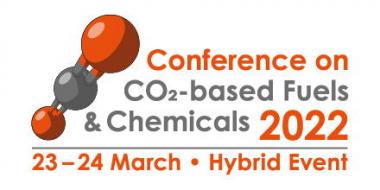Conference on CO2-based Fuels and Chemicals 2022
- Call for Papers and Posters
More than 200 leading international experts in Carbon Capture and Carbon Utilisation (Power-to-X) together with 20 exhibitors are expected to attend the hybrid event on 23–24 March 2022, in Cologne, Germany
Main topics of the conference are strategy & policy in CCU, renewable energy and green hydrogen production, carbon capture technologies, CO2-based fuels for transport and aviation, CO2-based building blocks, bulk and fine chemicals as well as advanced CCU technologies.
Carbon Capture and Utilisation (CCU) is one essential pillar for the supply of renewable carbon besides biomass utilisation and recycling. The transition to the direct use of CO2 as one alternative carbon source is needed as a key element to substitute fossil sources, to fight climate change and to shift towards sustainable and climate-friendly production and consumption. For providing the full benefits of CCU technologies the use of renewable energy is indispensable.
Especially the supply of green hydrogen is crucial for the production of CO2-based fuels for transportation and aviation as well as for bulk and fine chemicals.
The “Conference on CO2-based Fuels and Chemicals 2022”, 23–24 March 2022, Cologne, Germany. As a hybrid conference it combines a “live” in-person event with a “virtual” online component, www.co2-chemistry.eu.
CO2
nova-Institut GmbH









